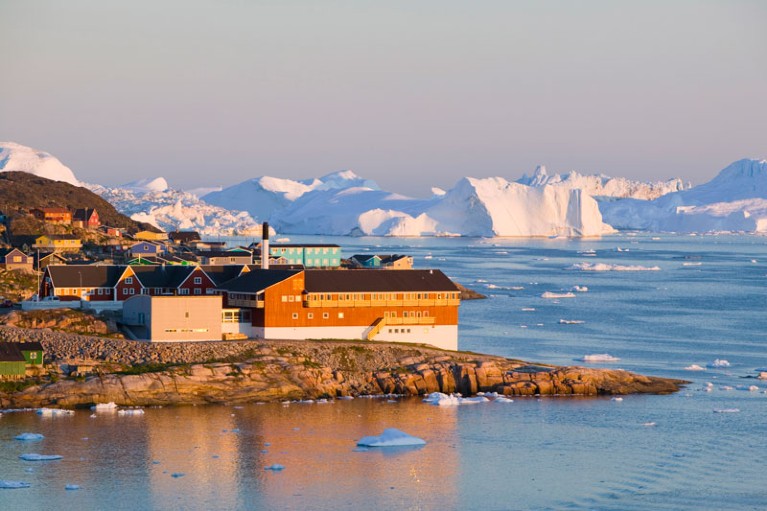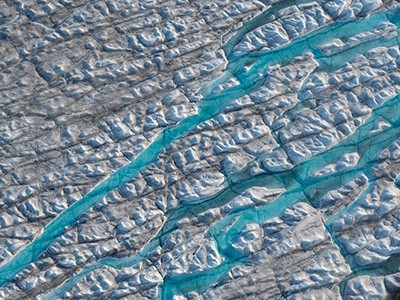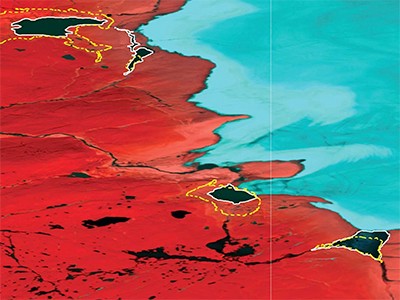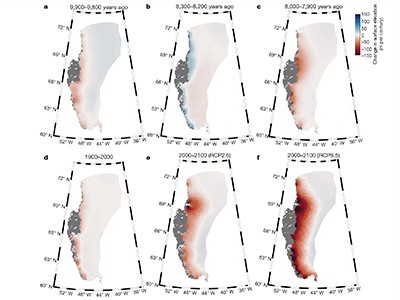
Arctic coastal communities such as those at Ilulissat in Greenland are at risk from rising sea levels as the climate warms.Credit: Ashley Cooper/Construction Photography/Avalon/Getty
Records are being broken in the Arctic, but not the kinds to celebrate. Last summer, Greenland lost more than twice as much ice as the yearly average since 2003. And in this century, the rate of ice loss from Greenland will exceed anything seen in the past 12,000 years, researchers report in this issue (J. P. Briner et al. Nature 586, 70–74; 2020).
Such changes are drastically altering the lives of the region’s four million people. Vanishing sea ice has fundamentally changed or even destroyed Indigenous Arctic communities’ subsistence hunting. As permafrost thaws and wave heights rise, whole villages are moving inland to escape coastal erosion.
But the Arctic is not just a landscape of nature and change. It is also the arena in which Canada, the northern European nations, Russia, the United States and now China compete with each other for regional influence, trade routes and the search for hydrocarbons.
Unlike Antarctica, the Arctic has no international treaty through which nations commit to peace, and to cooperation in science. Instead, most Arctic nations have a military presence in the region and they jostle for oil, gas and mineral resources, as well as newly opened shipping routes. But the eight Arctic states, along with six Indigenous peoples’ organizations, do have something else. All are members of the Arctic Council — an international forum that exists to facilitate science-based cooperation on issues including environmental protection and marine sustainability. Members share research expertise and communicate findings to policymakers, including the member countries’ foreign ministers, who attend biennial meetings.
Every two years, a different member country takes over the role of council chair. And, in 2021, it will be the turn of Russia, which will succeed Iceland. Relations between East and West are at their lowest point since the cold war, and most high-level dialogue between the United States and Russia has been suspended. Experts in Arctic policy are waiting to see whether this will affect how the council works once Russia takes the lead. The Arctic Council might be among the last of the major international forums still functioning in which Russia remains a crucial partner.
This is why it is imperative that both the incoming chair and the representatives of the Arctic Council’s member countries oversee a smooth handover, and ensure that the council’s vital scientific work isn’t disrupted by a potentially deteriorating situation between Russia, China and their Western neighbours.
The worst is yet to come for the Greenland ice sheet
In 2017, the Arctic countries inked a scientific cooperation agreement that has already paid dividends. Scientists from the member countries have established a number of expert working groups, including the Arctic Monitoring and Assessment Programme. This produces timely reports for decision-makers, such as one on the extent of ocean acidification and another on the risks of environmental pollution. There is also a project studying emissions from biomass burning across the Arctic — during each of the past two summers, Arctic wildfires have released more carbon dioxide than in any previous year since 2003.
Arguably, one of the council’s greatest strengths can also be interpreted as a weakness. Its decisions — including proposals for research projects — require unanimous agreement from members. It takes just one country to disagree for a carefully crafted agreement to come to nothing, as happened last year, when the council failed to produce the customary joint declaration at the end of a meeting of ministers in Rovaniemi, Finland. This was because the United States was unwilling to agree to language highlighting the threat of climate change.
Depending on the outcome of the US presidential elections in November, the United States could choose to engage less — or even obstruct the council’s work — once Russia takes over the chair. And that will put pressure on Russia to respond in kind.
At the same time, the role of Arctic Council chair is important to Russia because it allows the country to showcase itself as a constructive and influential regional partner, says Arctic policy analyst Heather Exner-Pirot. Moreover, Russia’s powerful foreign minister, Sergey Lavrov, now 16 years in the post, is among the council’s more experienced senior ministerial representatives. Lavrov will know that any nation that chairs a multilateral organization needs to act in a strictly neutral way, using its convening power to reach a consensus and help resolve disputes. The other Arctic nations, too, need to commit to working constructively with Russia. And it is crucial that Indigenous groups continue to have an influential seat at the table.
Rapid worldwide growth of glacial lakes since 1990
Friends of Europe, a Brussels-based think tank, argues in a report (go.nature.com/33hgvgp) that individual nations have little to gain from engaging in competitive behaviour in the Arctic. The region is unlikely to become a leading source of oil, nor is it likely to replace the world’s main shipping routes. Even as it warms, much of the Arctic remains difficult to access.
The COVID-19 pandemic has also thrown Arctic issues into a new light. Nations have fewer resources with which to pursue their ambitions in energy and trade, including exploitation of this fragile region. And the virus has highlighted the need for countries to work better together to prepare for international disasters — oil spills in the Arctic being one example.
As the framework through which many Arctic governance issues are worked out, the Arctic Council needs to maintain its strength and integrity as Russia takes the reins — and the focus on climate change must not be dimmed.
The Antarctic Treaty was agreed in 1959 during the cold war, an earlier period of severe international tensions. But it happened, in part, because countries chose to pull back on their competitive ambitions as scientific research on the continent began to accelerate. It shows the importance of research to peace-building, and provides hope — even in the current dark times — that the Arctic’s peoples could secure a more sustainable future.


 Read the paper: Rate of mass loss from the Greenland Ice Sheet will exceed Holocene values this century
Read the paper: Rate of mass loss from the Greenland Ice Sheet will exceed Holocene values this century
 The worst is yet to come for the Greenland ice sheet
The worst is yet to come for the Greenland ice sheet
 Rapid worldwide growth of glacial lakes since 1990
Rapid worldwide growth of glacial lakes since 1990
 Arctic sea ice hits second-lowest level on record
Arctic sea ice hits second-lowest level on record
 Dramatic sea-ice melt caps tough Arctic summer
Dramatic sea-ice melt caps tough Arctic summer







